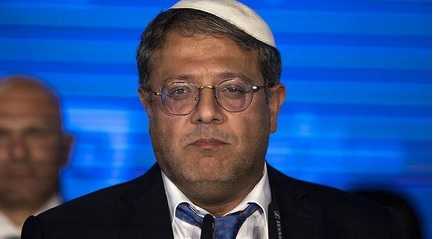
12 Apr 2023; MEMO: An Israeli report sheds light on the struggle the Minister of National Security and leader of the Otzma Yehudit Party, Itamar Ben-Gvir, is having in order to fulfil his electoral promises.
Ben-Gvir pledged, during his election campaign last year, to strengthen illegal settlement in the occupied West Bank, to deal with the security file in a different way than the previous government, and to make changes in the Israeli police and judicial system.
According to a report prepared by Israel Hayom newspaper yesterday, "Ben-Gvir is engaged in a struggle similar to that of the United Arab List in the previous government, which forced it to freeze its membership in the government coalition at the time."
The report added: "The United List did not succeed in fulfilling the promises it made to the Arab community, while Ben-Gvir's party did not achieve any of these promises in the right-wing government that was formed several months ago led by [Benjamin] Netanyahu."
It noted that "Ben-Gvir and his party members face the bitter reality that it is not easy to promote all their electoral promises, and they often face restrictions from the security, the Ministry of Finance, the government's legal advisors, and the prime minister as well."
OPINION: Tyranny of the minority – the struggle over Israel regime
It explained, "Last week, against the backdrop of dissatisfaction with the government's response to the rocket fire from Gaza, Lebanon, and Syria, Ben-Gvir hinted at the possibility of resigning from the Netanyahu government and supporting it from the outside."
"Ben-Gvir did not consider resigning from the government coalition, but rather retired from voting in the Knesset and decided to vote on the laws that his party deems appropriate while continuing to support the government against motions of no confidence and the budget, in order not to drag Israel into new elections," it added.
Netanyahu's position
The report indicated that "the Israeli minister conducted discussions with those close to him within his party and decided, in the end, to remain in the government while issuing some warnings to it at the present time," noting that "Netanyahu opposes Ben-Gvir's withdrawal from the government on the grounds that this will lead to its dissolution."
It stressed that "Ben-Gvir's dilemma revolves mainly around the security file, and he knows that he was primarily elected for that. He is also aware of the criticism levelled at him from the right-wing public regarding the failure in this file," pointing out that "Ben-Gvir still believes in his electoral promises, including a return to the policy of assassinations against the leaders of the Palestinian factions, but he always finds himself a single voice in the cabinet in front of officials of the security services, Defence Minister Yoav Gallant, and sometimes Netanyahu."
The report explained, "Lack of influence is the main cause of frustration within the government coalition parties, but despite that, there are two main things that keep Ben-Gvir in Netanyahu's government, the first of which is the National Guard."
"The Minister of National Security considers the National Guard a pioneering project that will restore security to the citizens of Israel, and he sees it as a great achievement for him. He is now awaiting the results of the committee that will discuss whether the guard will be established under the supervision of the police or under the supervision of his ministry," added the report.
As for the second matter, according to the report, "it is Ben-Gvir's unwillingness to bring down the right-wing government and let the left-wing parties take the reins of government. If the current government falls, a left-wing government will be formed with the participation of Arab parties after Knesset elections. This theory unites the ranks of Netanyahu's coalition, even in the most difficult moments, as estimates also indicate that as long as Ben-Gvir does not have a major achievement that can be marketed to his voters, he will not dissolve the government."




